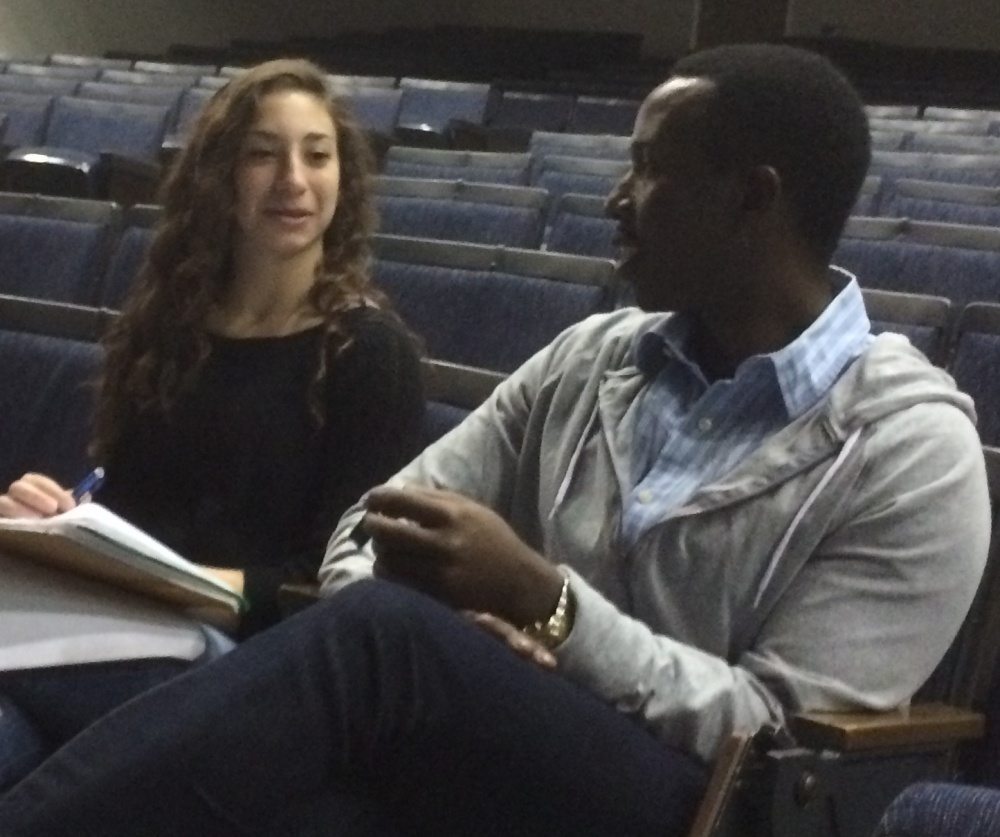Emmanuel Habimana from Kigali, Rwanda, was nine years old at the time of the Rwandan genocide. He is now a filmmaker, public speaker, and activist who engages audiences on the topics of genocide, forgiveness, and dealing with trauma. According to his press release, “His work began as a youth activist in Kigali where he collaborated with peers to assist other orphans of the 1994 Tutsi Genocide.” This spring, he embarked on a four-month multi-state American speaking tour coinciding with the 20th anniversary of the genocide.
Both Jon and Sid participated in the Memorial Library Summer Seminar in 2013. Through the Memorial Library mini-grant program, both teachers were able to host Emmanuel at their schools. Emmanuel spent a full day at each school where he showed students the documentary film he is co-directing entitled Komora, to Heal, addressing the ongoing attempts to heal communities in Rwanda through reconciliation. Emmanuel spoke to students about the impacts of colonialism and racism in his country, spoke about his own powerful journey, and took time to answer students’ questions. Before and after his formal presentation, he spent time meeting with small groups of students in their classrooms.
At New Prairie High School, Emmanuel gave a 90-minute presentation to 300 students. Immediately after, he spent 40 minutes talking with a group of students who approached him. Students were enthralled and engaged, and one student directly reported to Sid that “Emmanuel’s message of hope in the face of adversity was personally inspiring.” In preparation for Emmanuel’s visit, several social studies and language arts teachers intensified their instruction related to the Rwandan genocide, specifically in the areas of colonialism and tolerance. Emmanuel told Sid after his visit that their students “were among the most knowledgeable on the subject of any he had spoken with during his four-month tour of the United States.” In addition to impacting students and teachers, New Prairie’s principal called Emmanuel’s visit a “game changer” for the school, and the corporation superintendent spoke about Emmanuel’s visit while on local television, referring to it as part of their effort to enhance inclusion and tolerance.
At the Paddock View School, Emmanuel met with the entire student body, and much of the staff in their residential facility. The school serves students who have faced significant challenges with familial, foster, and legal systems. Emmanuel’s impact on the students was profound. After Emmanuel’s visit, one student began exhibiting a remarkable change in behavior and academic performance. He told Jon that “he had time to think about Emmanuel’s visit and he decided things would be different for him.” Jon finds that “Emmanuel played a significant role in helping the students see the difficulties in their lives, and finding a way of moving on, not letting their problems haunt them. The students have a better chance of being successful people in life due to Emmanuel’s visit.”
